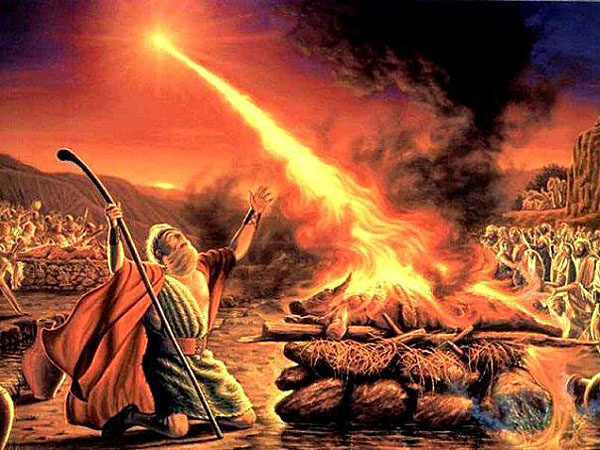Elijah, Emil G. Hirsch, Eduard Konig, Jewish Encyclopedia.
 The name means “Yhwh is (my) God,” and is a confession that its bearer defended Yhwh against the worshipers of Baal and of other gods. It has therefore been assumed that the prophet took this name himself (Thenius, in “Kurzgefasstes Exegetisches Handbuch zu I Könige,” xvii. 1). Elijah was a prophet in Israel in the first half of the ninth pre-Christian century, under King Ahab. In I Kings xvii. 1 and xxi. 17, etc., Elijah is called “the Tishbite” (), probably because he came from a place (or a family) by the name of “Tishbe.” A place of that name lay within the boundaries of Naphtali (comp. Tobit i. 2). But the Hebrew words must refer to a place in Gilead (see, however, Targum, Masoretes and David Ḳimḥi ad loc.).
The name means “Yhwh is (my) God,” and is a confession that its bearer defended Yhwh against the worshipers of Baal and of other gods. It has therefore been assumed that the prophet took this name himself (Thenius, in “Kurzgefasstes Exegetisches Handbuch zu I Könige,” xvii. 1). Elijah was a prophet in Israel in the first half of the ninth pre-Christian century, under King Ahab. In I Kings xvii. 1 and xxi. 17, etc., Elijah is called “the Tishbite” (), probably because he came from a place (or a family) by the name of “Tishbe.” A place of that name lay within the boundaries of Naphtali (comp. Tobit i. 2). But the Hebrew words must refer to a place in Gilead (see, however, Targum, Masoretes and David Ḳimḥi ad loc.).
Elijah, therefore, came from the land east of the Jordan, to wage war, in the name of the God of his fathers, against the worship of Baal. He was marked as an adherent of the old customs by his simple dress, consisting of a mantle of skins girt about the loins with a leather belt (II Kings i. 8). He began his activities with the announcement that the drought then afflicting the land should not cease until he gave the word (comp. Josephus, “Ant.” viii. 13, § 2).
Ahab and Elijah.
This announcement, addressed to Ahab and his wife, marked the beginning of a life of wandering and privation for the prophet. He fled from hiding-place to hiding-place, the first being by the brook Cherith (). Since Robinson’s explorations in Palestine (ii. 533 et seq.) this brook has been identified with the Wadi el-Ḳelt, which discharges into the Jordan near Jericho. But the resemblance between the two names is really less close than appears, for it must be remembered that “Ḳelt” is pronounced with the emphatic “k.” Moreover, since the expressions and refer to the land east of the Jordan, the brook Cherith must have been there, even if there is no modern river-name with which to identify it. After the brook Cherith had dried up, the prophet was forced to seek refuge beyond the boundaries of Israel, and found it in the Phenician Zarephath, about four hours’ journey south of Sidon, where a widow sustained him. She was rewarded by the prophet’s miraculous benefits (I Kings xvii. 9-24).
The greatest achievement of Elijah’s life was his victory over the priests of Baal at Mt. Carmel. Having heard that the other prophets of Yhwh were also persecuted, he requested King Ahab to gather the people of Israel, the 450 priests of Baal, and the 400 prophets of Ashtaroth on Mt. Carmel. Then he asked Israel the famous question- “How long do ye halt on both knees?” (A. V.- “How long halt ye between two opinions?”), meaning, “How long will ye be undecided as to whether ye shall follow Yhwh or Baal?” The people remaining silent, he invited the priests of Baal to a contest, proposing that he and they should each build an altar and lay a burnt offering thereon, and that the God who should send down fire from heaven to consume the offering should be accepted as the true God. After various unsuccessful attempts to get a favorable answer had been made by the prophets of Baal, while they were ridiculed with subtle irony by Elijah, Yhwh sent fire from heaven to consume his offering. Yhwh was recognized by Israel, and the priests of Baal were slain near the brook Kishon (I Kings xviii. 40).
Elijah at Mount Horeb.
But this victory brought no rest to Elijah. He had to leave Israel in order to escape the vengeance of Jezebel (ib. xix. 3 et seq.), and fled to the place where Israel’s Law had been promulgated by Moses. As he lay under a juniper-tree, exhausted by his journey, he was miraculously provided with food; and on reaching Horeb, the mountain of God, he heard the voice of the Lord exhorting him to patience. This is the sense of the famous passage (ib. xix. 11-13). God manifested Himself neither in the great wind that rent the mountains,nor in the earthquake, nor in the fire, but in the “still small voice.” The three following measures were suggested- the appointing of a foreign enemy of Israel; the anointing of an Israelitic rival king to Ahab’s dynasty; and the anointing of Elisha to continue the spiritual work of the prophet. This, the chief work of the prophet, Elijah himself carried on to the end of his life. After the election of Elisha (xix. 19-21), he prophesied both punishments and promises (xxi. 17-28; II Kings i. 3 et seq.), and left the field of his activities as suddenly as he had appeared (II Kings ii. 11).
Elijah is also mentioned in later Biblical and apocryphal passages as follows- II Chron. xxi. 12. et seq.; Mal. iii. 24; Ecclus. (Sirach) xlviii. 1; 1 Macc. ii. 58; Isaiah’s Martyrdom, ii. 14 (in Kautzsch, “Die Apokryphen und Pseudepigraphen des Alten Testaments,” 1898, ii. 125).



